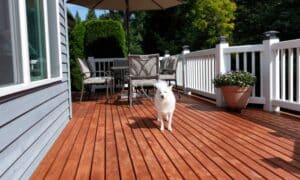The Yorkshire Terrier makes a wonderful companion for most people, as they are loyal, friendly and amusing to be around.
General Appearance and Description
Yorkies are popular with people who enjoy being able to take their dogs with them everywhere. It’s believed that the Yorkshire Terrier was originally a much bigger animal than the tiny dog that’s so popular today. Likely there was some selective breeding that went on and the dog gradually become smaller over the years. The first Yorkie who looked like the dog we know today was introduced at a dog show in 1870.
The Yorkie has a long, fine silky coat that is very straight and falls straight down from the spine on each side. Yorkie puppies are usually tan and black, while adult dogs are mostly steel blue on the tail and body and tan everywhere else.
Most owners who are not showing their Yorkies will keep the hair long and shaggy, but if the dog is shown, his hair will be clipped shorter and given more structure. The hair on the top of the head gets very long, so most owners will pull it back into a distinctive ponytail on the top of the head, while others will clip the top hairs so they stay out of the dog’s face. Yorkshire Terrier breeders will tell you that there is no true Teacup Yorkshire Terrier. All Yorkshire Terriers are small and the teacup is not an official designation at all.
Basic Temperament
Yorkie dogs are entertaining for many reasons but one favorite character trait of many owners is the dog’s obliviousness to his size. He thinks he’s a bigger dog and will enjoy any adventure that a larger dog might enjoy. Always energetic, the Yorkie is brave, extremely loyal to his owner and clever. He’s intelligent and a willing companion on any adventure.
Because he’s somewhat dismissive of his tiny size, the Yorkie will be willing to take on any challenge, and sees himself as a watchdog. He generally does a fine job of it, but his size ensures that he’s not a terribly good match for whatever walks through the front door. Like most small dogs, the Yorkie needs clear direct leadership. You must lead the Yorkie with a firm but gentle hand. If you establish that you are the leader of the pack, the Yorkie will submit to that, but if you don’t, he will exhibit troubling behavior problems like jealousy, aggression, barking, snapping and separation anxiety.
Care Required
All that fur means that some grooming is essential. The Yorkie’s coat needs to be combed or brushed at least weekly. If you keep the long hair on the top of the head tied back, you should replace the elastic or ribbon weekly. The Yorkie develops plaque easily on his teeth, so they should be cleaned regularly. Good for allergy sufferers, the Yorkie sheds little. When looking at know more about Yorkie dogs, read and learn as much as you can because this is truly a incredible little dog.
Exercise Requirements
While he might not be able to walk too far, the Yorkie likes s a daily walk, as well as regular play (but you should never substitute play for the daily walk). If you don’t give your dog a daily walk, he will be more likely to display behavior problems.
If you notice that your dog is running around the house in a bit of a crazy fashion, that’s a sign that he needs more exercise than he’s getting.
When you do take him out, be cautious of the conditions outside. Yorkshire Terriers are very sensitive to cold and prefer warm areas, as in warm climates, or simply being indoors on a cold day. The Toy Yorkie is truly a very special dog.
Training
The Yorkie is easy to train, but he can be stubborn, so be sure to establish yourself as the pack leader and give him clear boundaries when you’re training him. That will pay dividends when you try to train him. Some Yorkie dogs can be hard to housetrain.
Height and Weight
The Yorkie will be about 6 to 7 inches tall and will weigh right around 7 pounds.
Health and Longevity
While most Yorkies live long lives, they do run the risk of several health problems.
Most Yorkies suffer poor digestion and the owner should avoid giving too many special treats. Yorkshire Terriers should be given dry food only, because they run the risk of serious tooth decay and dry food keeps their teeth strong and sharp. Yorkie dogs can also run the risk of bronchitis; fragile bones can easily lead to fractures. Most Yorkies will live to be 12 to 15 years old.
Suitability
If you have an apartment, the Yorkie is an excellent choice. They enjoy being indoors and will find their activity inside happily. Because the Yorkie considers himself a companion pet, he enjoys senior citizens and people who will be happy to take him on adventures. If possible, he should not be placed in a house with young children who might be a little too rough with him. Yorkies can make surprisingly adequate watchdogs.





